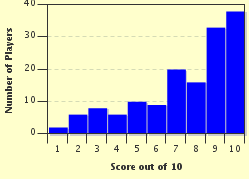Quiz Answer Key and Fun Facts
1. Sherman was a practitioner of total war and for this has been recognized by one historian as "the first modern general". Of the phrases below, which one most accurately describes the military strategy Sherman followed?
2. Sherman's first taste of success in combat came during which battle, which ironically comes from the Hebrew word for 'peace'?
3. The Battle of Chickasaw Bayou was a defeat for Sherman during which larger campaign that eventually led to the North gaining complete control of the Mississippi River?
4. During the Chattanooga Campaign, Sherman for the first time commanded an entire army. What was the name of the army Sherman commanded, a name which coincided with the campaign?
5. Which Confederate general opposed Sherman as he invaded Georgia, then again in the Carolinas, and was a pallbearer at Sherman's funeral in 1891?
6. Which mountain outside of Atlanta saw the biggest battle of the Atlanta Campaign as Sherman marched through Georgia?
7. The Academy Award-winning movie "Gone with the Wind" featured a scene in which a Southern city goes up in flames supposedly at the hands of Sherman's men. Which city was this?
8. When Sherman began his famous "March to the Sea", what city was his objective?
9. Why did Sherman and his men inflict such harsh treatment on South Carolina, culminating in the burning of Columbia the capitol?
10. The last major battle Sherman fought was the Battle of Bentonville. In which Tarheel state was Bentonville located?
Source: Author
tazman6619
This quiz was reviewed by FunTrivia editor
bloomsby before going online.
Any errors found in FunTrivia content are routinely corrected through our feedback system.

